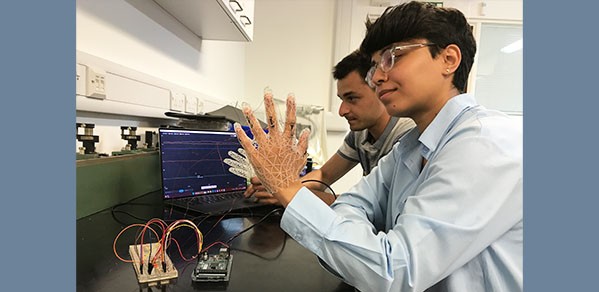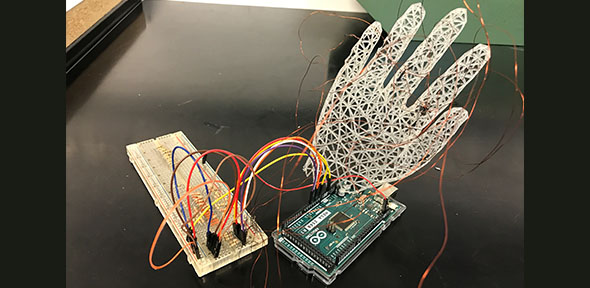
PhD students Ivan Grega and Sara AlMahri are researching a 3D printed self-sensing and wearable mesh ‘glove’ for the reconstruction of gestures, applicable to virtual reality (VR) and augmented reality (AR), sign language and other applications.
The main objective of our research project is to develop a mesh which enables the tracking of its 3D shape in real time.
PhD student Ivan Grega
The flexible conductive mesh, which Ivan and Sara 3D printed themselves, conforms to any desired shape, and it is this ongoing research, currently at the early proof of concept stage, that has won them a 2023 CAPE Acorn Postgraduate Research Award (CAPA). The Award, presented by the Centre for Advanced Photonics and Electronics (CAPE), is in recognition of their project titled 3D printed wearable mesh for reconstruction of gestures.
“Wearable elastic meshes with mounted sensors and transmitters have been widely used to collect high-fidelity biosignals, but what we would like to explore is the possibility of using the elastic mesh itself as a sensor,” said Ivan. “The main objective of our research project is to develop a mesh which enables the tracking of its 3D shape in real time.”
The material that Ivan and Sara use is piezoresistive – its conductivity changes in response to applied strain. As a result, measuring the resistance between the nodes of the lightweight lattice-like mesh enables them to infer deformations.
Next, they will develop an algorithm for the 3D reconstruction of the mesh’s deformation, but further challenges need to be addressed, such as creating stereolithography resin, which is both conductive and flexible.
Sara added: “The applications of such a system are numerous. For example, tracking the shape of a hand or other part of the human body can enable anthropomorphic robotic systems to learn motions. The tracking system, for instance, could provide feedback to a robot’s human operator as the robot tries to learn a motoric skill e.g. a tennis swing. The 3D representation of posture can also be used for real-time control of remote agents (e.g. remote surgery) or used in the digital domain (VR or AR).”

3D printed mesh glove, paired with 3D printed conductive strain gauges, connected to a circuit to enable real-time measurement of resistance changes as the fingers of the glove bend. Credit: Charlotte Hester.
About Ivan Grega
Ivan is a member of the Cambridge Solid Mechanics Group and is in the second year of his PhD, supervised by Professor Vikram Deshpande, and sponsored by the Ashby Postgraduate Scholarship (Department of Engineering).
His PhD research broadly focuses on architected materials. His current project is modelling the mechanical response of strut-based lattices with the help of machine learning.
In 2021, Ivan achieved his Masters of Engineering (MEng) in Mechanical and Aerospace Engineering.
Ivan said: “I really liked the structure of the Undergraduate Engineering Tripos at Cambridge. The first two years of general engineering teaches you a little bit of everything. For instance, the foundations of electrical engineering were very useful when it came to our current research project, as Sara and I needed to build circuits that measured the resistances of our 3D printed mesh.”
About Sara AlMahri
Sara is a first-year PhD student, also supervised by Professor Deshpande. Her current PhD research involves leveraging machine learning in the field of additive manufacturing to predict structural defects prior to printing, and achieving an efficient manufacturing process.
Sara has been awarded a full scholarship from the Advanced Technology Research Council (ATRC) in Abu Dhabi, UAE, to pursue her postgraduate studies at Cambridge. Previously, Sara was a senior researcher at the Advanced Materials Research Centre (AMRC) at the Technology Innovation Institute (TII), in Abu Dhabi, where she was responsible for the design, optimisation and manufacturing of novel lightweight architected structures, capable of withstanding high impact loadings.
Sara said: “With a deep passion for technology and its transformative potential, I embarked on a journey into the realm of entrepreneurship. Aspiring to become a tech entrepreneur, I took a decisive step forward by enrolling in the EnterpriseTECH programme at the Cambridge Judge Business School. I was honoured to be selected among the very first tranche of the Cambridge Royce Scholarship, as I received the esteemed Cambridge Royce Scholarship, awarded by the Henry Royce Institute.”

